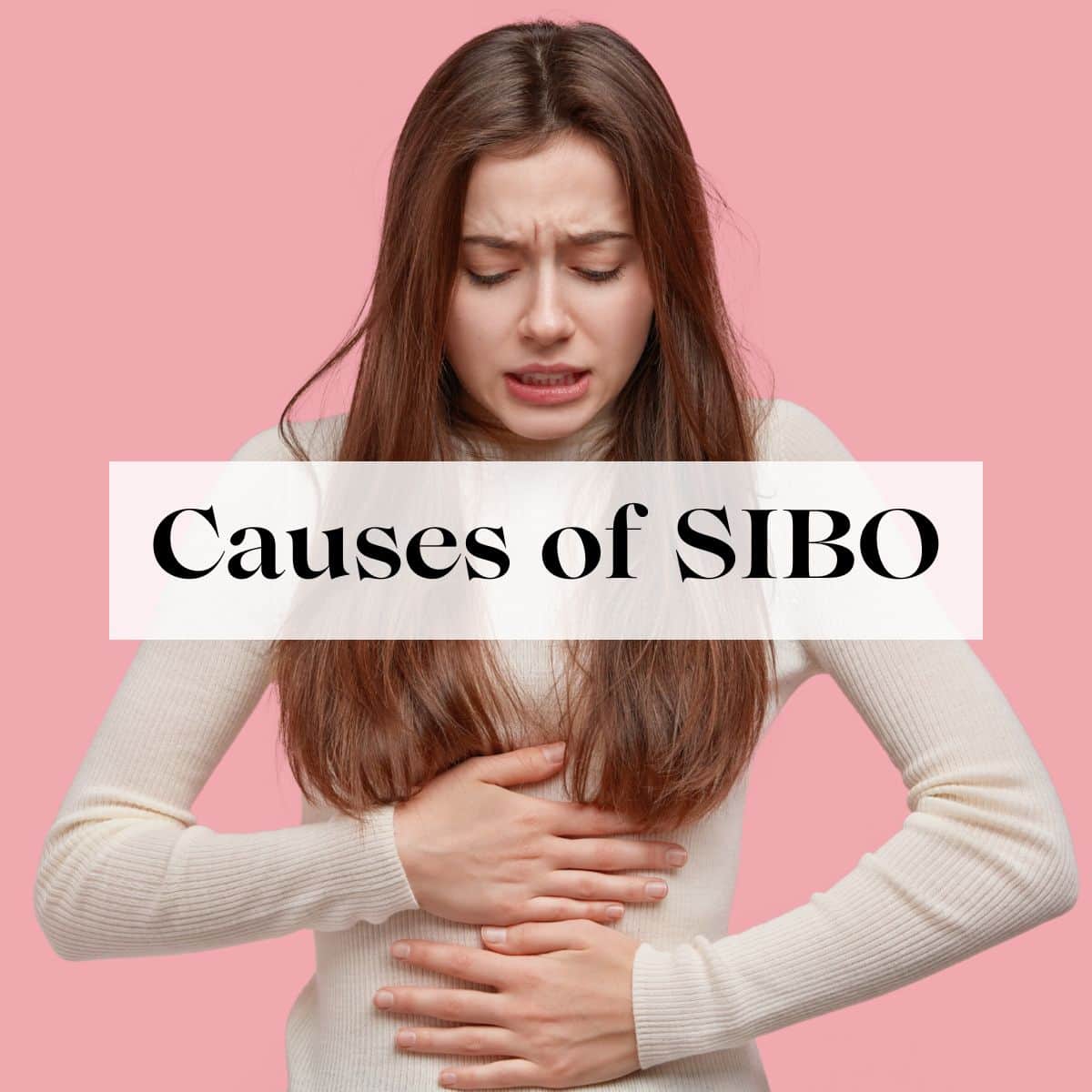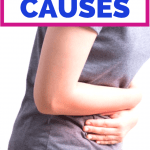This post reviews 15 different causes of small intestinal bacterial overgrowth (SIBO). It is important to determine the root cause of SIBO so that you can treat it properly and prevent it from reoccurring.

Would you like to save this for later?
After struggling with undiagnosed small intestinal bacterial overgrowth (otherwise known as SIBO) for almost 14 years and finally getting to the root cause of my gastrointestinal (GI) symptoms I have become passionate about educating others about SIBO. Because SIBO was only recently recognized as one of the many causes of irritable bowel syndrome (IBS) and other GI symptoms, many doctors are still not familiar with it so as a patient it can be very hard to get a diagnosis and proper treatment.
I had previously written a post titled "What is SIBO?" so if you haven't read that post yet I would start there. In today's post we are going to be discussing the various causes of SIBO. And there are many. And as more studies get done on SIBO in the coming years I suspect that even more causes will be identified.
Table of Contents
What is SIBO?
In brief, SIBO stands for small intestinal bacterial overgrowth. This is a condition where bacteria from the large intestine are present in excess amounts in the small intestine, where they don’t belong. This bacterial overgrowth can lead to a number of symptoms including but not limited to:
- Bloating
- Abdominal pain
- Constipation
- Diarrhea
- Weight loss
- Vitamin and mineral deficiencies including vitamin B12, thiamine, nicotinamide and iron deficiencies.
- Fat malabsorption which can also lead to deficiencies in fat soluble vitamins such as vitamins A, D and E.
Causes of SIBO
There are many different causes or risk factors for small intestinal bacterial overgrowth, and in some cases people may have more than one contributing factor. Remember, SIBO is due to an overgrowth of bacteria in your small intestine that are normally found in your large intestine. It’s not that the bacteria itself are bad per se, they've just found their way to the wrong place in your body. The real cause of SIBO is whatever caused the bacteria to proliferate or “overgrow” in the first place.
Here are 15 SIBO causes:
1. Functional and Motility Disorders
Problems with the way the bowels contract or function can lead to SIBO. Normally the migrating motor complex (MMC) helps clear the bowels of debris. Dysfunction of the MMC, specifically phase III of the MMC can lead to SIBO and is present in patients with irritable bowel syndrome (IBS), diabetes, intestinal pseudo-obstruction, small bowel diverticulosis, and people who use narcotic drugs. Gastroparesis is another motility disorder that can cause SIBO in certain people.
Other conditions which can affect intestinal motility and lead to SIBO include systemic sclerosis (formerly known as scleroderma) and radiation treatment for cancer, which leads to radiation enterocolitis.
2. Anatomic Abnormalities
Anatomic changes in the digestive or intestinal tract can cause SIBO by altering the normal movement or flow in the digestive tract. Anatomic changes that can cause SIBO include:
- adhesions from previous abdominal surgeries
- strictures from radiation, inflammatory bowel disease, or tumors
- diverticulosis
- gastric bypass surgery
- blind intestinal loops
3. Metabolic or Other Systemic Disorders
Diabetes mellitus can lead to SIBO when patients have intestinal neuropathy (where the nerves and muscles of the intestinal tract stop functioning properly due to prolonged exposure to high blood sugars).
As well, pancreatic insufficiency and liver cirrhosis are two other conditions that can also cause SIBO because the digestive enzymes and bile acids that are normally produced by these organs become altered or decreased, allowing abnormal bacteria to grow within the intestinal tract.
Another condition that can contribute to SIBO is hypothyroidism. Low thyroid function slows down the activity of the MMC and the bowels allowing pathologic bacteria to accumulate, hence leading to SIBO.
4. Immune Deficiencies
While immune deficiencies are not common, some of them can lead to small intestinal bacterial overgrowth. IgA deficiency, combined variable immunodeficiency and HIV are all immunodeficiencies that can cause SIBO.
5. Gastrointestinal Infections or Food Poisoning
Certain gastrointestinal infections can predispose people to getting SIBO. In particular, having C.difficile (C.diff) increases the risk of getting SIBO. Whether it is the infection itself, or the antibiotics used to kill the infection that actually causes SIBO isn’t entirely clear. It is also possible that both factors contribute.
And while I could not find any scientific data linking other gastrointestinal infections to an increased risk of SIBO (no studies have actually been done to examine this correlation yet), from my personal experience and from speaking with experts in the field I do believe that other gastrointestinal infections could also lead to SIBO. I believe my SIBO initially developed after I got Norovirus, and was then made worse when I later got C.difficile.
Dr. Mark Pimental who is an expert on SIBO believes that getting a GI infection or food poisoning causes a type of neuropathy or motility disturbance of the intestinal tract, which leads to stasis or slowing in the bowels which allows the bacteria to start to accumulate and cause SIBO.
6. Repeated Antibiotic Use
While antibiotics are sometimes necessary to treat bacterial infections the issue is that the antibiotics don’t just kill the “bad” bacteria causing the infection. They aren’t that specific. They also wipe out good or normal bacteria as well. This can disrupt the overall balance of bacteria in your gut, leading to something called dysbiosis. Without enough of the good bacteria to keep the bad bacteria in check, the bad bacteria can continue to multiply, which is why repeated antibiotic use can sometimes lead to SIBO.
7. Decreased Stomach Acid and Antacid Medications
Acid reflux or GERD (gastroesophageal reflux disease) is incredibly common. About half of adults will experience GERD at least once in a given year, and many people experience it on a weekly or even daily basis.
It has been shown that the use of proton pump inhibitors (medications that are used to treat heart burn by decreasing the production of stomach acid) leads to an increased risk of SIBO. H2 receptor blockers also decrease the production of stomach acid and are used to treat heart burn, but so far they haven't shown the same risk for developing SIBO.
8. Inflammatory Bowel Disease (IBD)
Patients with inflammatory bowel disease, either Crohn’s disease or Ulcerative Colitis, can be at risk of SIBO for many reasons. They may develop anatomic abnormalities from the disease itself, may require surgeries for their IBD, may require antibiotics if they get infections, and the inflammation and damage to the intestinal tract can also put them at risk.
9. Irritable Bowel Syndrome (IBS)
This one is kind of like the chicken and the egg analogy: in some cases SIBO may be the cause of IBS for patients, while in contrast, in some patients having IBS can lead to SIBO.
10. Alcohol Use
It has been shown that both heavy alcohol use and moderate alcohol use can lead to SIBO. There are a couple ways that alcohol can cause SIBO: alcohol can injure the small bowel mucosa cells leading to increased intestinal permeability and it can also affect the normal muscular contractions in the intestine. The alcohol itself can also feed certain types of harmful bacteria in the intestinal tract.
11. Celiac disease
Celiac disease, which is an autoimmune reaction to the protein gliadin in certain grains such as wheat, barley and rye, can alter gut motility, leading to small intestine dysmotility, and possibly SIBO.
12. Other causes of SIBO
There have been more studies on SIBO recently and as such, other risk factors for getting SIBO have been identified including:
- Chronic diarrhea
- Aging
- Chronic pancreatitis
- Chronic renal failure
I hope you found this helpful! As you can see there are many potential causes of SIBO and I am sure that in the coming years even more causes will be identified. I will do my best to update this article as more information and studies become available.
Frequently asked questions:
No, SIBO is not a contagious condition. You cannot catch SIBO from someone else.
SIBO can cause various symptoms including abdominal pain, gas, bloating, and diarrhea.
Other health information you will like:
- What is SIBO?
- What to eat after a colonoscopy
- How to heal keratosis pilaris with diet
- How I healed my acne naturally
- Deodorant health risks
Our expertise:
Dr. Erin Carter, MD, FRCPC, is a physician with board certifications in internal medicine and rheumatology. She is passionate about preventative healthcare including nutrition, environmental health and low toxicity living. She is also a self-trained chef and has been creating and publishing healthy recipes since 2015. Her recipes have been featured on many different websites and online publications.






Kelly
I never knew the connection of hypothyroidism and SIBO. Makes sense. Super informative. Thanks for this!
Robin Miller
So informative. I’m currently going to a rheumatologist for my arm. Very inflamed and going for physical therapy. Next I got a uti. Then itching all over my body. So I feel your talking directly to me. I also have asthma. My md wanted me to take anti acid pills but I said no thank you. Started whole 30 a few days ago. I’m starting to feel so much better. I have a ways to go and learn. But so happy I found you. Thank you for reaching out to us, and teaching us.
Robin